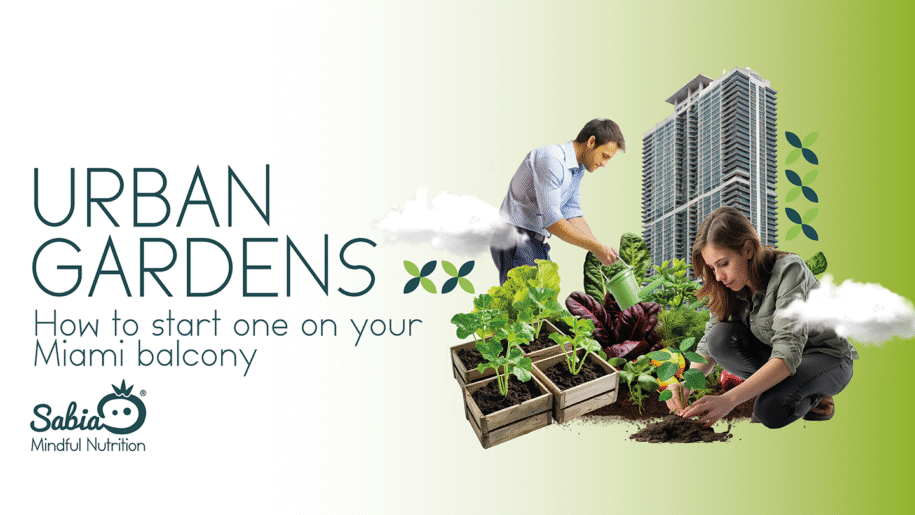Urban Gardens: How to start one on your Miami balcony
In the bustling city of Miami, where high-rise buildings and busy streets dominate the landscape, the idea of growing your food on a balcony may seem like a luxury. However, the rise of urban gardening has made it not only feasible but also a highly rewarding endeavor. Urban gardens, especially in places like Miami, offer a myriad of benefits, from access to fresh, organic produce to contributing positively to the environment. Whether you’re a seasoned gardener or a complete beginner, this guide will provide you with all the information you need to start your urban garden on your Miami balcony.
Why Start a Balcony Garden in Miami?
The concept of urban gardening is nothing new. However, in recent years, more and more people are embracing the idea of creating green spaces in small metropolitan areas. In Miami, this trend is growing due to several factors, including the city’s year-round warm climate, the growing demand for organic food, and the desire for sustainable living.
Environmental Benefits
Urban gardening offers environmental benefits, especially in urban areas like Miami. Growing your food reduces the carbon footprint by eliminating the need for transportation and packaging of store-bought produce. Additionally, it helps improve air quality by introducing more plants and greenery into the urban environment.
Health Benefits
Having a garden on your balcony means access to fresh, pesticide-free produce right at your fingertips. Fresh fruits, vegetables, and herbs can boost your diet with essential vitamins and nutrients. Furthermore, gardening has been shown to reduce stress, increase mental well-being, and even improve physical health by promoting regular exercise.
Sustainability
By growing your own food, you contribute to a more sustainable lifestyle. Miami’s tropical climate is ideal for growing a variety of fruits, vegetables, and herbs, and it allows you to cultivate crops year-round, minimizing reliance on imported food and reducing waste.
Choosing the Right Plants for Your Balcony Garden
The first step in creating a successful balcony garden is selecting the right plants. Miami’s climate is warm and humid, so it’s essential to choose plants that thrive in such conditions.
-
Herbs: Herbs such as basil, mint, rosemary, and thyme are great for balconies because they don’t require much space and can grow well in containers. They are perfect for adding flavor to meals and can be harvested year-round.
-
Vegetables: Some vegetables grow wonderfully in containers. Consider growing tomatoes, lettuce, spinach, and peppers. These crops are easy to manage, and their compact size makes them ideal for small spaces.
-
Fruits: While fruit trees may seem too large for a balcony, smaller varieties such as dwarf citrus trees (lemons, limes, and oranges) are perfect for container gardening. Additionally, strawberries and blueberries can thrive in hanging baskets or pots.
-
Flowers: If you’re looking to add a pop of color to your balcony, consider growing flowers like marigolds, sunflowers, or geraniums. Flowers not only add beauty but also attract pollinators like bees and butterflies, which are essential for a healthy garden.
Container Gardening: The Key to Success
Given the limited space available on a balcony, container gardening is the most practical method for growing plants in Miami. Using pots, containers, and raised beds allows you to create a flexible and adaptable gardening space. Here’s what you’ll need to get started:
-
Containers: Choose containers that are large enough for the roots of your plants to grow. Make sure they have proper drainage holes to prevent waterlogging. Clay or plastic pots, wooden crates, and even repurposed items like old buckets can all be used for container gardening.
-
Soil: High-quality soil is crucial for healthy plant growth. Consider using a mix of potting soil, compost, and perlite for good drainage and aeration. Organic compost will provide essential nutrients to your plants.
-
Watering: Since balconies are typically exposed to direct sunlight, your plants may require more frequent watering, especially during the summer months. Consider setting up an irrigation system or use self-watering containers to reduce the need for constant attention.
-
Fertilization: Fertilize your plants regularly with organic fertilizers to ensure they get the nutrients they need. Avoid chemical fertilizers, as they can harm the environment and affect the taste of your produce.
Maximizing Sunlight and Space
Miami’s sunny weather is both an advantage and a challenge when it comes to balcony gardening. Plants need sunlight to thrive, but too much direct sunlight can dry out your plants quickly. Here are some tips for managing sunlight:
-
Positioning: Place your containers in areas that receive plenty of sunlight, typically 6-8 hours a day for most plants. However, some plants, like leafy greens, may need some shade during the hottest part of the day.
-
Vertical Gardening: If you have limited horizontal space, consider using vertical gardening techniques. Vertical planters, trellises, and hanging baskets allow you to grow more plants in a smaller area.
-
Shading: To protect sensitive plants from too much sun, consider using shade cloths or creating a natural barrier with taller plants or climbing vines. This can help reduce the intensity of the sun and keep your plants healthy.
Maintenance and Care
Maintaining your balcony garden requires regular attention. Make sure to check your plants for signs of pests and diseases. Remove dead leaves and flowers, water regularly, and prune your plants to encourage healthy growth. Harvest your crops when they are ripe, and don’t forget to give your plants a little TLC during extreme weather conditions.
Urban Gardening in Miami: A Lifestyle Choice
Starting a balcony garden in Miami isn’t just about growing your own food—it’s a lifestyle choice that can lead to a healthier, more sustainable life. By taking the time to nurture your plants, you’ll not only benefit from fresh produce but also experience the joy of gardening in the heart of the city.
As you embark on this journey, remember that every small step counts towards a larger environmental impact. Whether you’re growing a few herbs or cultivating a full vegetable garden, you’re contributing to a more sustainable and mindful way of living. As you incorporate fresh fruits and vegetables into your meals, consider pairing them with healthy, balanced meal plans from local services that support your green lifestyle.
By incorporating urban gardening into your daily routine, you are investing in your health, the environment, and the future of Miami. Start small, and let your balcony garden grow into something beautiful and rewarding.
References:
-
Florida Urban Gardening (2021). “Growing Vegetables in Miami’s Climate.” Florida Gardening Magazine.
-
GreenThumb Gardening (2020). “Urban Gardening on Small Balconies: Tips for Beginners.” Urban Agriculture Journal.
-
Miami Gardeners Association (2022). “Balcony Gardening in Miami: Everything You Need to Know.” Miami Gardening Weekly.


